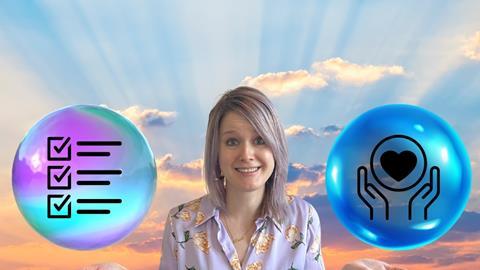The demands in academia for early-career researchers can often feel endless, which requires a solid and sustainable system for maintaining productivity. Isabelle Kohler shares her journey towards balanced productivity, exploring strategies to optimize her work without compromising her well-being.
I always look forward to my long summer holidays as a time to slow down, spend more time offline, and catch up on the books I’ve been wanting to read. This summer was no different: I spent hours in my hammock, immersed in reading. Interestingly, many of the books I chose to read focused on personal development, especially productivity, such as ‘The 7 Habits of Highly Effective People’ by Stephen Covey (which I’ve read many times already) and ‘Slow Productivity’ by Cal Newport.
The focus on books about productivity is no coincidence. After a year of part-time sick leave, I’m now settling into a more stable work routine. Going through such a significant life event has encouraged me to redefine the word ‘productivity’. I don’t want to fall back into old patterns of overwork and stress, and sacrifice my well-being. I need a system to manage my tasks, requests, and overall workload even more effectively, one that balances sustainable productivity with fulfillment and well-being.
With this in mind, I decided to put the concepts from these books into practice, experimenting with different strategies to see what works best for me. I’ve tested two new methods that have worked really well for me (so far!). The first is Stephen Covey’s weekly planning method, which helps me prioritize my most important tasks – both urgent and non-urgent – and schedule them within a given week. By assigning tasks to the different ‘roles’ I play in my life (such as human being, friend, assistant professor, writer, business owner), I ensure that I allocate my time and energy appropriately between work and non-work activities that are important to me.
The second method is the ‘pull system’ mentioned in Newport’s book. I track and assign projects and tasks into two folders: ‘holding tank’ and ‘active.’ I only focus on active tasks and pull new ones from the holding tank when I’m ready. This system gives me a clear overview of my commitments and helps me avoid taking on more than I can manage.
These new approaches complement the strategies I’ve implemented over the past decade to maintain productivity and balance. Curious? Here are my all-star tips for balanced productivity for early-career researchers:
- Prioritize deep work by implementing time-blocking. Dedicate uninterrupted blocks of time to deep, meaningful work – whether it’s writing, conducting experiments, or reading literature. This focused approach allows significant progress on complex tasks, leading to a greater sense of accomplishment.
- Prioritize tasks and learn to say no. Categorize tasks by urgency and importance (using the so-called Eisenhower Matrix). Focus on the important ones and schedule non-negotiable time for tasks that are important but not urgent. Learning to say no to non-essential tasks and commitments can reduce overwhelm and sharpen your focus on what really matters.
- Favor quality over quantity. This may sound difficult to implement for PhD students in a world where performance is often measured by quantitative metrics (such as number of articles published, impact factor, h-index), but it can have a huge impact on creating fulfilling work. Instead of rushing to complete as many tasks as possible, focus on doing fewer things better.
- Establish clear boundaries. Define your work hours and stick to them. Protect time for relaxation, hobbies, sleep, relationships, and other activities that fulfill you. Off-moments are crucial for long-term productivity and well-being. Make sure to communicate these boundaries to colleagues.
- Go offline. During work hours, set aside offline time with no emails or phone distractions. Remove notifications from your computer and turn off work-related notifications on your phone during evenings and weekends. This helps you reclaim focus and protect your personal time.
All of these methods may take some practice before you see results and may require adjustments over time. I now make it a habit to reflect on my productivity strategies and their effectiveness twice a year, usually during the summer and Christmas holidays. This allows me to evaluate what’s working and what’s not, and to adjust my strategies (or find new ones to try) if I’m not completely satisfied.
As our (professional) lives evolve, our priorities shift, too. That’s why it’s crucial to adapt our productivity systems accordingly.
If you are interested in learning more about how to navigate academia with balanced productivity, do not hesitate to join the NextMinds Community! For this, you have plenty of choices: visit NextMinds website to learn more about my work, sign up for the newsletter, and follow me and NextMinds on LinkedIn.



















Nog geen opmerkingen